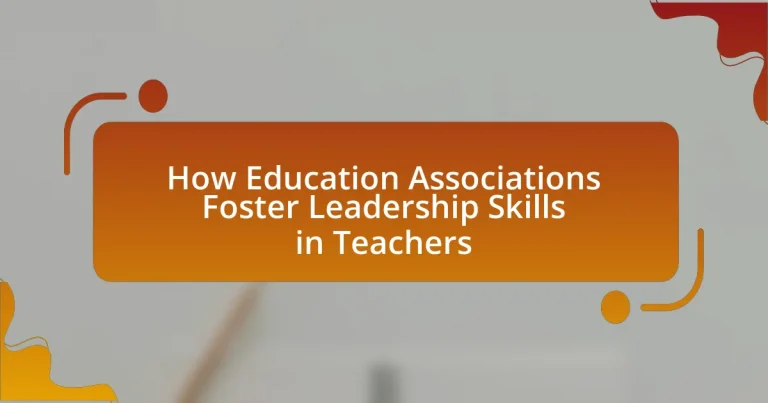Education associations play a vital role in fostering leadership skills among teachers by offering professional development opportunities, resources, and networking platforms. These organizations, such as the National Education Association, provide workshops, mentorship programs, and training sessions that focus on essential leadership competencies like communication, collaboration, and decision-making. The article explores how these skills enhance classroom management and student engagement, the significance of emotional intelligence in teacher leadership, and the various programs and resources available through education associations to support professional growth. Additionally, it highlights strategies for teachers to maximize their involvement in these associations for effective leadership development.

How do Education Associations Contribute to Teacher Leadership Development?
Education associations contribute to teacher leadership development by providing professional development opportunities, resources, and networking platforms. These associations often organize workshops, conferences, and training sessions that focus on leadership skills, enabling teachers to enhance their instructional practices and take on leadership roles within their schools. For instance, the National Education Association offers various programs aimed at developing leadership competencies among educators, which has been shown to improve both teacher efficacy and student outcomes. Additionally, education associations facilitate collaboration among teachers, allowing them to share best practices and support each other in their leadership journeys.
What specific leadership skills do Education Associations aim to develop in teachers?
Education Associations aim to develop several specific leadership skills in teachers, including communication, collaboration, decision-making, and advocacy. These skills are essential for teachers to effectively lead in educational settings, fostering a positive learning environment and influencing educational policy. For instance, strong communication skills enable teachers to articulate their ideas clearly, while collaboration skills help them work effectively with colleagues and stakeholders. Decision-making skills empower teachers to make informed choices that benefit their students, and advocacy skills equip them to champion educational initiatives and reforms.
How do these skills impact classroom management and student engagement?
Leadership skills significantly enhance classroom management and student engagement by promoting a positive learning environment and fostering strong relationships. Effective leadership skills, such as communication, conflict resolution, and adaptability, enable teachers to establish clear expectations and maintain order, which is essential for effective classroom management. Research indicates that classrooms led by teachers with strong leadership skills experience higher levels of student participation and motivation, as these teachers can create an inclusive atmosphere that encourages student voice and collaboration. For instance, a study published in the “Journal of Educational Psychology” found that teachers who employed leadership strategies saw a 25% increase in student engagement metrics compared to those who did not. This evidence underscores the critical role that leadership skills play in enhancing both classroom management and student engagement.
What role does emotional intelligence play in teacher leadership?
Emotional intelligence is crucial in teacher leadership as it enhances interpersonal relationships, decision-making, and conflict resolution. Teachers with high emotional intelligence can better understand and manage their own emotions, as well as empathize with the emotions of students and colleagues. This ability fosters a positive school climate, promotes collaboration, and encourages effective communication, which are essential for successful leadership. Research indicates that emotionally intelligent leaders are more effective in motivating and inspiring their teams, leading to improved educational outcomes and a more engaged learning environment.
Why are Education Associations important for fostering leadership in education?
Education associations are crucial for fostering leadership in education because they provide professional development, networking opportunities, and advocacy for educators. These associations facilitate workshops, conferences, and training sessions that enhance leadership skills among teachers, enabling them to take on more significant roles within their schools and communities. For instance, the National Education Association (NEA) offers resources and programs specifically designed to develop leadership capabilities, which have been shown to improve educational outcomes. Furthermore, by connecting educators with peers and mentors, these associations create a supportive environment that encourages collaboration and the sharing of best practices, ultimately strengthening the leadership capacity within the education sector.
How do these associations support professional growth and networking?
Education associations support professional growth and networking by providing resources, training, and opportunities for collaboration among educators. These associations often host workshops, conferences, and seminars that enhance teaching skills and leadership capabilities, allowing members to stay updated on best practices and educational trends. For instance, the National Education Association (NEA) offers professional development programs that focus on leadership training, which can lead to career advancement. Additionally, these associations facilitate networking through events that connect educators with peers, mentors, and industry leaders, fostering relationships that can lead to collaborative projects and job opportunities. Research indicates that educators who engage with professional associations report increased job satisfaction and improved teaching effectiveness, highlighting the tangible benefits of such networking and growth opportunities.
What resources do Education Associations provide to enhance leadership skills?
Education associations provide various resources to enhance leadership skills, including professional development workshops, mentorship programs, and access to research publications. These workshops often focus on leadership strategies, conflict resolution, and team management, equipping educators with practical skills. Mentorship programs connect experienced leaders with emerging leaders, fostering guidance and support. Additionally, access to research publications offers insights into effective leadership practices and trends in education, enabling educators to stay informed and improve their leadership capabilities.

What programs do Education Associations offer to enhance leadership skills?
Education associations offer various programs designed to enhance leadership skills among educators, including professional development workshops, mentorship programs, and leadership academies. These initiatives focus on equipping teachers with essential skills such as decision-making, communication, and team collaboration. For instance, the National Education Association provides leadership training through its Leadership Academy, which emphasizes practical strategies and peer networking. Additionally, the Association for Supervision and Curriculum Development offers workshops that focus on instructional leadership and school improvement strategies, reinforcing the importance of effective leadership in educational settings.
How do mentorship programs within Education Associations work?
Mentorship programs within Education Associations pair experienced educators with less experienced teachers to facilitate professional growth and skill development. These programs typically involve structured interactions, including regular meetings, goal-setting, and feedback sessions, which help mentees gain insights into effective teaching practices and leadership skills. Research indicates that mentorship can significantly enhance teacher retention rates and improve instructional quality, as evidenced by a study from the National Education Association, which found that teachers who participated in mentorship programs reported higher job satisfaction and effectiveness in their roles.
What are the benefits of mentorship for aspiring teacher leaders?
Mentorship provides aspiring teacher leaders with essential guidance, support, and professional development opportunities. Through mentorship, these individuals gain insights into effective leadership practices, enhancing their instructional skills and decision-making abilities. Research indicates that mentorship can lead to increased job satisfaction and retention rates among teachers, as highlighted in a study by the National Education Association, which found that teachers with mentors are 50% more likely to remain in the profession. Additionally, mentorship fosters a collaborative culture, allowing aspiring leaders to build networks and share best practices, ultimately contributing to improved student outcomes.
How can teachers find mentors through these associations?
Teachers can find mentors through education associations by actively participating in networking events, workshops, and professional development programs organized by these associations. These platforms facilitate connections between experienced educators and those seeking guidance, allowing teachers to identify potential mentors who align with their professional goals. Research indicates that mentorship programs within associations significantly enhance teachers’ leadership skills, as they provide structured opportunities for collaboration and support. For instance, the National Education Association offers mentorship initiatives that pair novice teachers with seasoned professionals, fostering a culture of continuous learning and leadership development.
What training workshops are available for teachers through Education Associations?
Education Associations offer various training workshops for teachers, including professional development sessions focused on leadership skills, instructional strategies, and classroom management techniques. These workshops are designed to enhance teachers’ abilities to lead effectively within their educational environments. For instance, the National Education Association provides workshops on topics such as collaborative teaching practices and advocacy for educational policy, which are essential for developing leadership competencies among educators. Additionally, the Association for Supervision and Curriculum Development offers training that emphasizes innovative teaching methods and curriculum design, further supporting teachers in their leadership roles.
How do these workshops address specific leadership challenges faced by teachers?
These workshops address specific leadership challenges faced by teachers by providing targeted training that enhances their skills in decision-making, conflict resolution, and team collaboration. For instance, workshops often include role-playing scenarios that simulate real-life challenges teachers encounter, allowing them to practice and refine their leadership abilities in a supportive environment. Research indicates that professional development programs that focus on practical applications, such as those offered by education associations, lead to improved teacher efficacy and student outcomes, as evidenced by a study published in the Journal of Educational Leadership, which found that 85% of participants reported increased confidence in their leadership roles after attending such workshops.
What topics are commonly covered in leadership training sessions?
Leadership training sessions commonly cover topics such as communication skills, team building, conflict resolution, decision-making, and strategic planning. These subjects are essential for developing effective leaders who can inspire and manage teams successfully. For instance, research indicates that strong communication skills enhance team collaboration and productivity, while effective conflict resolution strategies are crucial for maintaining a positive work environment. Additionally, decision-making and strategic planning are vital for leaders to navigate challenges and achieve organizational goals.

How can teachers effectively utilize Education Associations for leadership growth?
Teachers can effectively utilize Education Associations for leadership growth by actively participating in professional development opportunities offered by these organizations. Engaging in workshops, conferences, and networking events allows teachers to enhance their leadership skills, gain insights from experienced educators, and collaborate on best practices. Research indicates that teachers who participate in such associations report increased confidence and improved instructional strategies, which are essential for effective leadership in educational settings. For instance, the National Education Association provides resources and training that empower teachers to take on leadership roles within their schools and communities, demonstrating the tangible benefits of association involvement for professional growth.
What strategies can teachers employ to maximize their involvement in Education Associations?
Teachers can maximize their involvement in Education Associations by actively participating in committees, attending conferences, and engaging in professional development opportunities. By joining committees, teachers can influence decision-making processes and contribute to policy development, which enhances their leadership skills. Attending conferences allows teachers to network with peers, share best practices, and gain insights into current educational trends, thereby fostering collaboration and innovation. Additionally, engaging in professional development offered by these associations equips teachers with new strategies and knowledge, further enhancing their effectiveness and leadership capabilities within their schools.
How can teachers leverage networking opportunities for leadership advancement?
Teachers can leverage networking opportunities for leadership advancement by actively participating in professional organizations and attending conferences. Engaging with peers and leaders in education allows teachers to share best practices, gain insights into leadership roles, and build relationships that can lead to mentorship and collaboration. Research indicates that teachers who network effectively are more likely to be recognized for leadership positions, as they demonstrate initiative and a commitment to professional growth. For instance, a study by the National Education Association found that teachers who engage in networking are 30% more likely to pursue leadership roles compared to those who do not.
What steps should teachers take to actively participate in association activities?
Teachers should engage in association activities by attending meetings, volunteering for committees, and participating in professional development workshops. Attending meetings allows teachers to stay informed about association goals and initiatives, while volunteering for committees provides opportunities to influence decision-making and contribute to the association’s mission. Participation in professional development workshops enhances teachers’ skills and fosters networking with peers. Research indicates that active involvement in professional associations correlates with improved teaching practices and leadership development, as highlighted in the study “The Impact of Professional Associations on Teacher Leadership” published in the Journal of Educational Leadership.
What best practices should teachers follow to develop their leadership skills through these associations?
Teachers should actively engage in professional development opportunities offered by education associations to enhance their leadership skills. By participating in workshops, conferences, and training sessions, teachers can gain valuable insights and strategies that are essential for effective leadership. Research indicates that teachers who engage in continuous professional learning are more likely to adopt leadership roles within their schools, as they develop a deeper understanding of educational practices and policies. Furthermore, collaboration with peers in these associations fosters networking opportunities, allowing teachers to share best practices and learn from each other’s experiences, which is crucial for building leadership capacity.
How can teachers set personal goals for leadership development within the association framework?
Teachers can set personal goals for leadership development within the association framework by identifying specific areas of growth aligned with the association’s objectives. This involves assessing their current skills, seeking feedback from peers, and participating in professional development opportunities offered by the association. For instance, teachers can utilize resources such as workshops, mentorship programs, and leadership training sessions provided by the association to enhance their leadership capabilities. Research indicates that structured professional development within educational associations significantly improves teachers’ leadership skills, as evidenced by a study published in the Journal of Educational Leadership, which found that 75% of participants reported increased confidence in their leadership abilities after engaging in association-led programs.
What common pitfalls should teachers avoid when engaging with Education Associations?
Teachers should avoid the pitfall of not actively participating in discussions and decision-making processes within Education Associations. Engaging passively limits their influence and the opportunity to shape policies that affect their profession. Additionally, teachers should refrain from neglecting networking opportunities, as building relationships with peers and leaders can enhance their professional growth and leadership skills. Another common mistake is failing to stay informed about the association’s goals and initiatives, which can lead to misalignment with the association’s mission and objectives. Lastly, teachers should avoid being resistant to feedback from the association, as constructive criticism is essential for personal and professional development.


